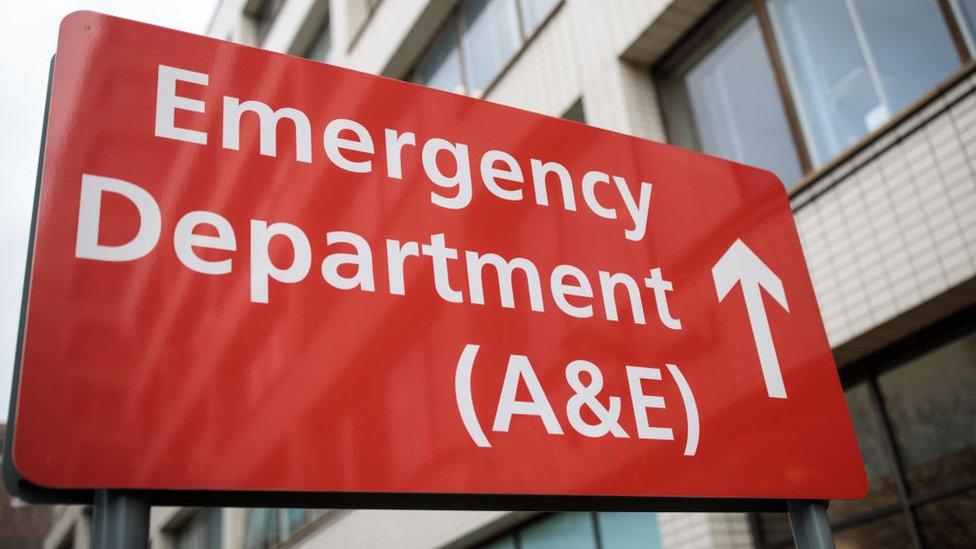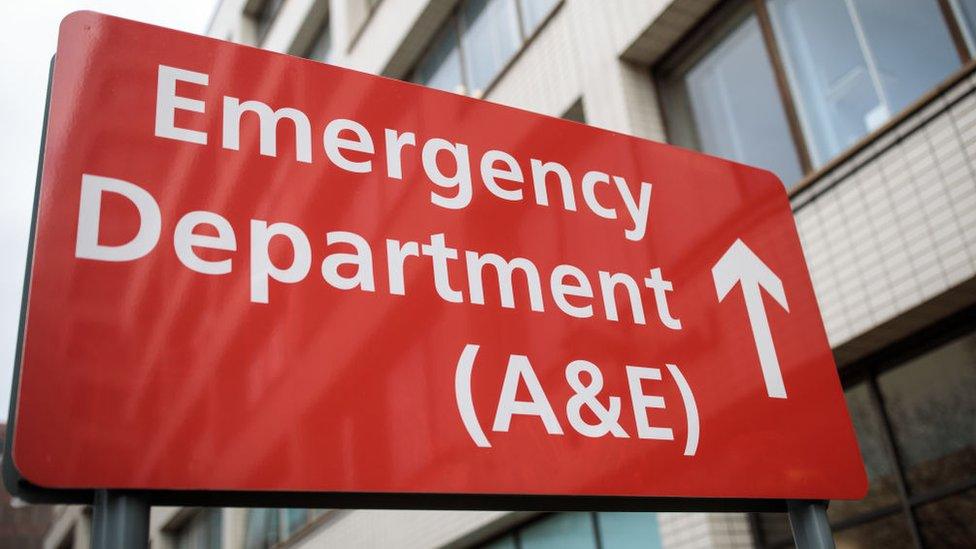Northern Ireland emergency care has 'fallen off a cliff'
- Published
- comments

NI emergency departments are under "extreme pressure"
Emergency healthcare in Northern Ireland has "fallen off a cliff and the ground is rapidly racing up to meet us", a senior doctor has said.
Dr Ian Crawford, vice president of the Royal College of Emergency Medicine in NI, said staff were "working in exceptionally challenging positions".
As of Friday afternoon, 401 patients had waited at least 12 hours in A&Es over a 24-hour period.
Dr Crawford said he was aware of patients waiting more than 48 hours.
He called for a restoration of political oversight for the healthcare service in Northern Ireland.
Current ministerial targets are for 95% of those admitted to emergency departments to be treated and discharged, or admitted, within four hours and for no patient to have to wait more than 12 hours.
Dr Miriam McCarthy, director of commissioning at the Health and Social Care Board said: "It's always difficult to know what is a crisis and what is increased pressure."
Responding to comments made by Dr Crawford she agreed the health service was on a cliff edge saying: "At the minute we are seeing an unprecedented position - that is certainly the case and the symptom of that is certainly being seen in our [emergency departments]."
On Friday evening the Western Trust issued a tweet urging the public not to attend the emergency department unless in need of "urgent medical or mental health attention".

Allow X content?
This article contains content provided by X. We ask for your permission before anything is loaded, as they may be using cookies and other technologies. You may want to read X’s cookie policy, external and privacy policy, external before accepting. To view this content choose ‘accept and continue’.

On Thursday, the Health and Social Care Board said an increasing number of sick children and older people attended emergency departments requiring to be admitted.
The board confirmed elective procedures had been scaled back to allow the trusts to deal with an increase in emergency admissions, but said it was "normal practice at this time of year".
In an update on Friday afternoon, the Health and Social Care Board said staff across the health trusts were "continuing to work tirelessly".
It assured the public that anyone who requires attention for an urgent or life-threatening condition will receive it.
"It is unacceptable and regrettable that some people are having to wait longer to be treated in emergency departments than normal or to be admitted to hospital at this time, for this we apologise," said the health board.
'A lack of dignity'
Speaking to BBC Radio Ulster's Good Morning Ulster programme on Friday, Dr Crawford said elderly patients waiting on trolleys faced a number of risks.
He said these ranged from "a lack of dignity and privacy... [and] delays in delivering care" through to "increased risks of mortality associated with spending long times in emergency departments".
Dr Crawford said he could not cite a direct example of someone in Northern Ireland dying due to their experience of an emergency department, but referenced an unpublished study reported in the Guardian last month, external.
Dr Crawford said while there was usually an increased winter demand on departments, the current pressure mostly came from a "increasing numbers of patients attending our emergency departments year on year".
Increased pressure on Northern Ireland's emergency departments follows strikes by healthcare workers last month over pay and staffing issues.
A number of further strikes have been pencilled in for the coming months.
- Published2 January 2020
